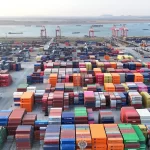President Donald Trump launched a trade war Tuesday against America’s three biggest trading partners, drawing immediate retaliation from Mexico, Canada and China and sending financial markets into a tailspin as the U.S. faced the threat of rekindled inflation and paralyzing uncertainty for business.
Just after midnight, Trump imposed 25% taxes, or tariffs, on Mexican and Canadian imports, though he limited the levy to 10% on Canadian energy. Trump also doubled the tariff he slapped last month on Chinese products to 20%.
Beijing retaliated with tariffs of up to 15% on a wide array of U.S. farm exports. It also expanded the number of U.S. companies subject to export controls and other restrictions by about two dozen.
In an address to Congress Tuesday night, Trump repeated two different explanations for his tariffs on Canada and Mexico. He cited the trade deficits the U.S. has with both countries, but also said, “they’ve allowed fentanyl to come into our country at levels never seen before, killing hundreds of thousands of our citizens.”
Trump also acknowledged there could be “a little disturbance” from the tariffs, a possible nod to the stock market’s sharp falls in the past two days as well as concerns about inflation.
“It may be a little bit of an adjustment period,” he said after claiming that farmers would benefit from reciprocal tariffs on countries that have tariffs on U.S. exports. “You have to bear with me again and this will be even better.”
Canadian Prime Minister Justin Trudeau said his country would plaster tariffs on over $100 billion (U.S. dollars) of American goods over the course of 21 days.
“Today the United States launched a trade war against Canada, their closest partner and ally, their closest friend. At the same time, they are talking about working positively with Russia, appeasing Vladimir Putin, a lying, murderous dictator. Make that make sense,” Trudeau said.
Later in the day, Commerce Secretary Howard Lutnick said the U.S. would likely meet Canada and Mexico “in the middle,” with an announcement coming as soon as Wednesday.
“I think he’s going to figure out, you do more, and I’ll meet you in the middle in some way,” Lutnick said.
A Canadian senior government official said Lutnick called Ontario Premier Doug Ford after Ford’s press conference and asked him to stand down. The official, who spoke on condition of anonymity because they were not authorized to speak publicly about the call, said Ford told the U.S. commerce secretary he’ll go harder.
The official said Lutnick told Ford that Trudeau’s “very dumb” comment and remarks by other Canadian officials were not helpful, but said Lutnick seemed to acknowledge the tariffs are a part of negotiation toward a trade deal.
A senior Canadian official said Trudeau told the premiers of Canada’s provinces that he hopes to speak to Trump on Wednesday. The official spoke on condition of anonymity because they were not authorized to speak publicly about the call.
Mexican President Claudia Sheinbaum said Mexico will respond to the new taxes with its own retaliatory tariffs. Sheinbaum said she will announce the products Mexico will target on Sunday. The delay might indicate that Mexico still hopes to de-escalate Trump’s trade war.
China indicated on Tuesday night that it would not back down.
“If war is what the U.S. wants, be it a tariff war, a trade war or any other type of war, we’re ready to fight till the end,” China’s embassy to the United States posted on X.
The president is abandoning the free trade policies the United States pursued for decades after World War II. He argues that open trade cost America millions of factory jobs and that tariffs are the path to national prosperity. He rejects the views of mainstream economists who contend that such protectionism is costly and inefficient.
Import taxes are “a very powerful weapon that politicians haven’t used because they were either dishonest, stupid or paid off in some other form,” Trump said Monday. “And now we’re using them.”







